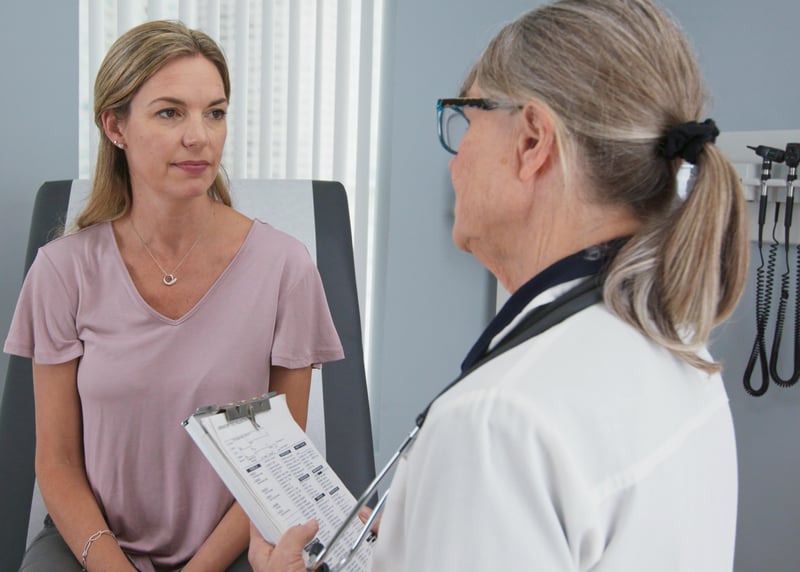Get Healthy!

- Amy Norton
- Posted November 1, 2022
Hormonal Therapy Won't Prevent Chronic Ills After Menopause: Expert Panel
Experts are once again advising doctors and women against using menopausal hormone therapy to ward off chronic diseases -- 20 years after a landmark trial dashed those hopes.
In updated recommendations, the U.S. Preventive Services Task Force (USPSTF) is reiterating its past advice on menopausal hormone therapy: It should not be prescribed as a way to reduce the risks of heart disease, stroke or any other chronic health condition.
That's based on years of evidence that while hormone therapy might lower certain disease risks, it has no effect on others -- and, most concerning, raises the risks of ills such as breast cancer, stroke and dementia.
"We concluded there is no net benefit. The benefits and risks cancel each other out," said Dr. James Stevermer, a member of the Task Force panel.
The USPSTF is a government-funded panel of volunteer experts that makes recommendations on preventive health care practices, such as disease screenings and using medication to reduce disease risks.
The Task Force first came out with recommendations on menopausal hormone therapy 20 years ago, after findings were released from a landmark trial called the Women's Health Initiative. It was set up to test the long-held belief that taking hormones after menopause could help protect women from heart disease and other major chronic ills.
The trial results turned that thinking on its head. Researchers found that hormonal therapy actually increased the risk of heart disease, stroke, blood clots and breast cancer.
In the years since, further research has backed up those findings: At best, menopausal hormonal therapy seems to have no effect on development of heart disease, and it has been tied to additional risks -- including a higher likelihood of developing urinary incontinence, gallbladder disease or dementia.
There appear to be some benefits, including decreased risk of bone fractures and colon cancer. But they do not outweigh the dangers, according to the USPSTF.
And over the years, the panel has updated its recommendations several times -- always arriving at the same conclusion.
Periodic updates are part of the Task Force process, Stevermer said, so that any new evidence can be evaluated.
But it also cannot hurt to reiterate this particular recommendation, according to Dr. Alison Huang, a professor of medicine at the University of California, San Francisco. She co-wrote an editorial published Nov. 1 with the recommendations in the Journal of the American Medical Association.
"I do think there are still some women hoping that menopausal hormone therapy will keep them healthy," Huang said. Some doctors, she added, also hold that belief.
In the years since the Women's Health Initiative trial, some have argued that the timing of menopausal hormone therapy may be key: Women in that trial were often well past menopause, and the theory is that hormone replacement may bring benefits only if it's started early, at the start of menopause.
But there is no solid proof that's the case, both Huang and Stevermer said.
"If you're looking to preserve your health," Huang said, "this is not the right strategy. I think these updated recommendations are reinforcing that."
She also made another point: Even if hormone therapy were beneficial for a short period and causing harm before then, it would be hard to put that into practice.
"How long do you take it?" Huang said. "When do you stop?"
All of that said, both doctors stressed that the recommendations pertain only to disease prevention. No one is saying that women should not use hormone therapy to treat menopause symptoms, including severe hot flashes and vaginal dryness.
In fact, Huang said, hormone therapy is the most effective treatment available for hot flashes and night sweats -- which, for some women, can be debilitating. When hormone therapy is used for menopause symptoms, the U.S. Food and Drug Administration advises taking the lowest dose that helps, for the shortest period possible.
Given the potential risks, though, many women want non-hormonal options. Unfortunately, Huang said, none has yet been proved as effective as hormone therapy.
Plus, she added, alternatives like antidepressants and the anti-seizure medication gabapentin have not undergone the rigorous safety scrutiny that hormone therapy has.
What is clear, both doctors said, is that hormones should not be used for disease prevention.
The good news, Stevermer said, is that there are proven ways to curb the risks of heart disease, stroke and various cancers -- ranging from a healthy diet and exercise, to detecting and treating high blood pressure and diabetes, to screening for breast and colon cancers.
More information
The American College of Obstetricians and Gynecologists has more on menopausal hormone therapy.
SOURCES: James Stevermer, MD, MSPH, professor, family and community medicine, University of Missouri School of Medicine, Columbia, Mo.; Alison Huang, MD, professor, medicine, internal medicine physician, University of California, San Francisco; Journal of the American Medical Association, Nov. 1, 2022





